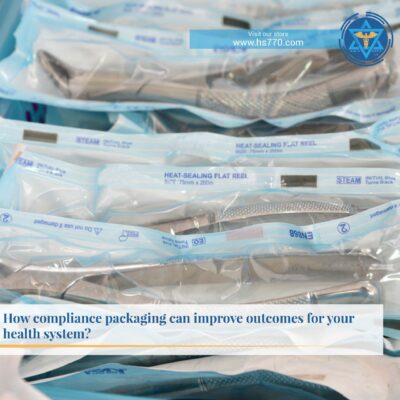There’s no doubt that the healthcare industry is under immense pressure to improve outcomes and control costs. In fact, compliance packaging can play a significant role in improving both of these things. But what is compliance packaging? Simply put, it’s a type of packaging that helps patients adhere to their medication regimen. This can include anything from blister packs to adherence labels.
How simple do you make it for a patient to take their medications as directed once they are discharged from one of your hospitals? With automated compliance packing from a central fill facility, your health system can make it simple and increase drug adherence in the process.
What is Compliance Packaging?
In the healthcare industry, compliance packaging refers to the use of unit-dose or unit-of-use packaging for medications. These packages are designed to help patients take their medication as prescribed and improve patient outcomes.
Compliance packaging can be used for both prescription and over-the-counter medications. For prescription medications, compliance can help patients who have difficulty remembering to take their medication or who have trouble opening traditional pill bottles. For over-the-counter medications, compliance packaging can help patients who need to take multiple doses of medication throughout the day.
Unit-dose packages are often easier for patients to open and keep track of their medication than traditional pill bottles. Unit-of-use packages can also help prevent accidental double dosing or missed doses. In addition, many unit-dose and unit-of-use packages come with built-in features that remind patients when it is time to take their medication.
Compliance packaging can improve your health system by helping patients take their medication as prescribed. In addition, compliance packaging can help reduce the risk of medication errors and improve communication between patients and caregivers.
How Compliance Packaging Works
Hospitals and health systems have a good opportunity to provide a compliance package to patients, but most of them do not offer it. There are a few health systems that have implemented full automation of compliance packaging on their own. Most health systems pack manually or semi-automatically for a short period of time.
All of a patient’s medications are contained in a single package known as adherence packaging, which can take the form of blister packs or pouches. This makes it simpler for them to adhere to their medication plan.
The device will sort every prescription drug for the patient. The device will arrange the patient’s meds in accordance with the dosage, timing, frequency, and direction specified.
This makes it simpler for the patient to take the appropriate medication at the appropriate time and boosts patient outcomes. As a result, it is a useful method for treating long-term illnesses like high blood pressure, diabetes, and excessive cholesterol.
Medication non-adherence is more likely in patients with life-threatening conditions. For example, patients who have HIV, hepatitis C, or cardiac disease, must take their drugs as prescribed.
How does Compliance Packaging Improve Outcomes?
There are many ways in which compliance packaging can improve outcomes for your health system. Perhaps the most obvious way is that it can help to ensure that patients receive their medication in a timely fashion and in the correct dosage. This is because compliance packaging can help to streamline the process of dispensing medication, thereby reducing the chances of errors.
In addition, compliance packaging can also help to improve patient adherence to their medication regimen. This is because it can make it easier for patients to keep track of their pills and take them as prescribed. When patients are more adherent to their medication regimen, they are more likely to experience better health outcomes.
Finally, compliance packaging can also help to reduce costs for your health system. This is because it can help to minimize waste and reduce the need for expensive inventory management systems. When all of these factors are taken into account, it is easy to see how compliance packaging can have a positive impact on the overall performance of your health system.
Benefits of Compliance Packaging
There are many benefits of compliance packaging for hospitals and health systems, including:
1. Reduced medication errors:
Compliance packaging can help to reduce the number of medication errors that occur within a health system. By clearly labeling each individual dose and providing instructions on how to take the medication, patients are less likely to make mistakes that could lead to serious consequences.
2. Improved patient safety:
Patient safety is improved when compliance packaging is used, as it can help to reduce the risk of adverse events occurring. This is due to the fact that patients are less likely to make errors when taking their medication, and all medications are clearly labeled so that they can be easily identified.
3. Enhanced communication between providers and patients:
Compliance packaging can improve communication between providers and patients by ensuring that all pertinent information about medication is included on the label. This information can include things like dosage instructions, warnings, and any potential side effects. When patients are aware of this information, they can be more engaged in their care and better able to follow their treatment plan.
4. Increased adherence to medication regimens:
One of the most important benefits of compliance packaging is that it can help increase adherence to medication regimens. By making it easier for patients to take their medications as prescribed. They are more likely to stick with their treatment plan and experience better health outcomes as a result.
5. Decreased costs:
In addition to all of the above benefits, compliance packaging can also help to decrease costs.
Conclusion
When medications are given to elderly patients being treated for hypertension, adherence to the treatment plan and treatment results can be improved by including instructions regarding correct self-administration and the day each dose is supposed to be taken on in the package. In order to establish a better healthcare system that leads to better adherence to treatment plans and improved treatment outcomes, better packaging for medicines may be used.
FAQs
What is compliance packaging?
Compliance packaging, also known as adherence packaging, means that you combine all of the medications a patient takes into one package, such as blister packs or pouches, to help them stick to their medication schedule.
Why are compliance and adherence important?
Compliance and adherence are important because medical organizations and insurance carriers require that patients follow their treatment programs. If they don’t, there can be negative consequences.
What are the benefits of medication compliance?
Medical compliance controls chronic conditions, treating temporary conditions, and overall long-term health and well-being.
What impact would noncompliance have on patients?
The impact of non-compliance is serious. Some of them include the inefficiency of the treatment being provided. A decline in the health of the patient, additional hospitalizations, or even deaths.
What does compliance mean in medical terms?
Compliance in medical terms is defined as “the extent to which the patient’s behavior matches the prescriber’s recommendations”

PhD Scholar (Pharmaceutics), MPhil (Pharmaceutics), Pharm D, B. Sc.
Uzma Zafar is a dedicated and highly motivated pharmaceutical professional currently pursuing her PhD in Pharmaceutics at the Punjab University College of Pharmacy, University of the Punjab. With a comprehensive academic and research background, Uzma has consistently excelled in her studies, securing first division throughout her educational journey.
Uzma’s passion for the pharmaceutical field is evident from her active engagement during her Doctor of Pharmacy (Pharm.D) program, where she not only mastered industrial techniques and clinical case studies but also delved into marketing strategies and management skills.
Throughout her career, Uzma has actively contributed to the pharmaceutical sciences, with specific research on suspension formulation and Hepatitis C risk factors and side effects. Additionally, Uzma has lent her expertise to review and fact-check articles for the Health Supply 770 blog, ensuring the accuracy and reliability of the information presented.
As she continues her PhD, expected to complete in 2025, Uzma is eager to contribute further to the field by combining her deep knowledge of pharmaceutics with real-world applications to meet global professional standards and challenges.








